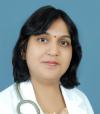What Is The Cause And Treatment For Infertility?

Im married for 2 years and still trying to hv baby. Already done all my fertility check up and i hv endo at my right side ovary (2cm). My question is did my body weight can cause my infertility too? My height is 166cm and my weight is 40kgs. Any recomendation, prescription or advise to increase my body weight?
XXXX
detailed answer below
Detailed Answer:
Hello and welcome,
It seems that you have a low BMI or low body mass index and so are underweight. Your BMI is just around 14 while a normal one is about 25.
For increasing body weight there are certain principles that need to be followed. Weight increases if we eat more calories than we utilize. For example if a person uses 2000 calories and eats 2000 weight will remain static. If the person eats 1800 calories then weight will decrease and if she eats 2200 then weight will increase.
However whenever we advise on weight gain programs the main focus is to gain muscles and not fat. So exercise is an integral part of any weight gain program along with a proper diet.
Now I will explain about the types of food that we commonly eat. There are three categories of food:
Body building food: meat. Eggs, milk, sprouts
Energy giving food: oil, ghee, butter, cheese,
Protective food: fruits and vegetables
A balance of all these three categories is needed in a proper diet. Also the amount of food and the combination depends upon the kind of work that you do. So for a person doing heavy physical work the calorie need may vary from 2700-3000 while for a person just sitting about even 1700 calories may be sufficient.
So just check your level of physical activity and the type of food that you eat.
Now a diet for an average adult doing moderate physical work:
A breakfast of 2 idlis, or 1 medium dosa, or 4 dhoklas, or a bowl of poha or upma with a glass of milk suffice. Lunch and dinner combined must provide 4 chapatis, 2 cups of rice, 2 cup of vegetables, curd, milk, an egg or a helping of meat or sprouts or cereal, 3 fruits, and salad are sufficient. Beverages like tea or coffee can be taken once or twice. Some people may add a piece of sweet as dessert.
Adding protein powders like proteinex or similar also help increase the protein intake. Fried food and food with too much oil must be restricted but can be had occasionally.
However this plan has to be tailor made as per your calories needs and expenditure. So a one to one talk with a dietician is strongly recommended so that your needs are better assessed and you can avail long term benefits. The plan will need modification once an ideal body weight is achieved.
So I hope this helps with your query.
Start keeping a diary of your daily activities for a few weeks and also your daily diet. Take this with you to a dietician and then a proper plan can be drawn
Take care and have a good day.
Dr Madhuri
Answered by

Get personalised answers from verified doctor in minutes across 80+ specialties



